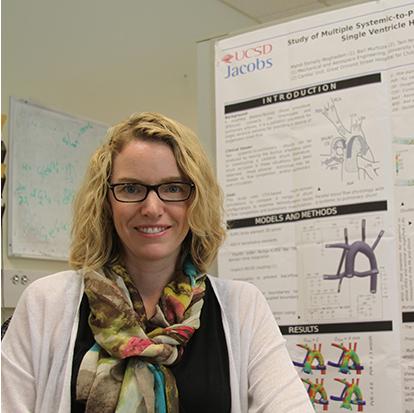event
Conversations in Inventing the Future of Healthcare
Primary tabs
"Patient Specific Modeling in Cardiovascular Disease: From Computation to Clinic"
Alison L. Marsden, PhD
Mechanical and Aerospace Engineering
University of California, San Diego
Cardiovascular disease is the leading cause of death worldwide and the number one killer of both men and women in the United States. In children, congenital heart defects are the number one cause of infant deaths in the US, affecting roughly one out of every 100 births, with more than 50% of patients requiring at least one invasive surgery during their lifetime. Numerous advances in the treatment of adult and pediatric cardiovascular disease have arisen from partnerships between engineers and clinicians. Over the past decade, cardiovascular blood flow simulation has proven to be one of the most dynamic examples of this critical partnership, already having led to paradigm shifts in clinical practice. Cardiovascular simulations fill several crucial gaps in current clinical capabilities. First, the medical field still relies primarily on statistical outcomes data and trial and error approaches to advance surgical methods and device technologies. Simulations now offer a powerful means to predict the outcome of surgeries, systematically test and optimize new surgical approaches and devices, and to personalize treatments for individual patients. Second, and perhaps equally importantly, simulations can be used to characterize the in vivo mechanical environment, providing key hemodynamics and mechanical stimuli data that cannot be readily obtained from medical imaging. These data are a key component of the mechanobiological puzzle relating the mechanical environment to subsequent disease progression. In this talk, I will review the current state of the art and discuss our recent methodological advances including (1) optimization algorithms allowing customized treatments for individual patients, (2) uncertainty quantification tools to examine confidence in simulation predictions and their applicability to “human” implementation, and (3) multiscale modeling algorithms that dynamically couple local hemodynamics to circulatory physiology. I will then present examples that illustrate the clinical impact of these tools, including (1) novel surgical approaches for treatment of children with single ventricle heart defects, and (2) patient specific simulations of vein graft failure mechanisms in coronary artery bypass graft patients. Finally, I will discuss future plans, including predictions of vascular growth and remodeling and application to a wide range of diseases in children and adults.
Ajit Yoganathan, PhD - faculty host
Status
- Workflow status: Published
- Created by: Colly Mitchell
- Created: 11/05/2014
- Modified By: Fletcher Moore
- Modified: 04/13/2017
Categories
Keywords
Target Audience

